Seattle Lung Cancer Conference Highlights Emerging Therapies and Technological Innovations in Treatment

Author
Binaytara Team
The 2025 Seattle Lung Cancer Conference, hosted by Binaytara, convened oncology leaders from across the country to spotlight the latest advances in lung cancer treatment. From spirited debates on antibody-drug conjugates to thought-provoking keynotes on surgical innovation and targeted therapies, this CME-accredited event highlighted how research and collaboration are driving more equitable and effective care for patients with non-small cell and small cell lung cancers.
Ahead of Lung Cancer Awareness Month in November, medical oncologists, surgeons, oncology fellows, nurses, and other healthcare providers gathered in the heart of downtown Seattle on October 11, 2025, to discuss advancing care for patients with non-small cell lung cancer (NSCLC) and small cell lung cancer (SCLC). This CME-accredited educational summit featured informative sessions, scholarly camaraderie, and witty presentations that left attendees engaged and inspired.
Advancing Global Cancer Care Through Innovation and Collaboration
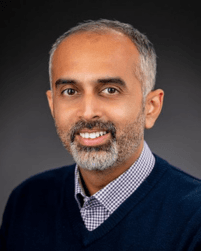
Conference Chair Dr. Siddhartha Devarakonda of the Swedish Cancer Institute opens the 2025 Seattle Lung Cancer Conference.
Aligned with Binaytara’s mission to minimize cancer disparities, the conference began with a brief welcome from the chair, Dr. Siddhartha Devarakonda (Swedish Cancer Institute), followed by an inspiring presentation from Binaytara’s president, Dr. Binay Shah. Dr. Shah highlighted the organization’s efforts to improve cancer care globally, including plans to establish a 200-bed cancer hospital in Janakpur, the creation of Oncoblast to facilitate adoption of the latest cancer treatments in clinical practice, and other global oncology initiatives in Nigeria and Nepal aimed at building world-class cancer programs. Sharing his journey from practicing as an oncologist in New York to founding a nonprofit focused on healthcare access, Dr. Shah motivated attendees to remain committed to minimizing disparities in cancer care. His message resonated in his closing statement: “A vision for a healthier tomorrow begins by bridging gaps today, through innovation, partnership, and an unwavering commitment to bring world-class cancer care to every community, no matter the resources or location.”
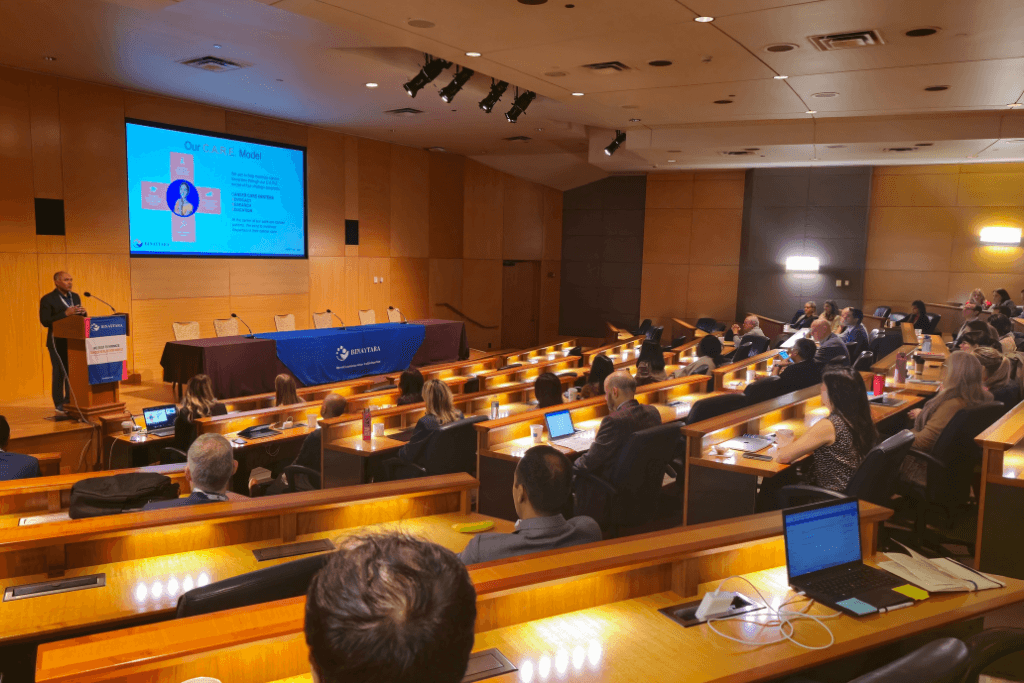
Binaytara president and co-founder, Dr. Binay Shah, addressing Seattle Lung Cancer Conference participants.
The Humorous Debate Session: Thoracic Oncologists’ Differing Perspectives on Lung Cancer Treatments
The morning of the Seattle Lung Cancer Conference was filled with spirited debates on different lung cancer treatment modalities. Are Antibody-Drug Conjugates (ADCs) “the bee’s knees” or “old wine in a new bottle”? Dr. Ram Subramanian and Dr. Dipesh Uprety tackled this question with clinical trial evidence and hilarity, with both oncologists emphasizing the importance of strict standards for evaluating lung cancer treatments.
Other debates in Session 1 included the question of which treatment regimen is better for patients with EGFR-mutated lung cancer: the one studied in the MARIPOSA clinical trial or that of the FLAURA2 study? Dr. Jyoti Malhotra (City of Hope) and Dr. Christina Baik (Fred Hutchinson Cancer Center) presented their perspectives, ultimately highlighting the availability of multiple effective options for patients. Discussion on bispecifics in small cell lung cancer was also a point of contention between Dr. Kelly Paulson and Dr. Jeffrey Ward. While both agreed on the promising efficacy of the bispecific drug tarlatamab, the opponent emphasized caution due to the need for more data and the limitations of existing studies. An interactive Q&A followed, breaking down nuances in lung cancer management, drawing from the experts’ clinical experience and patient care insights.
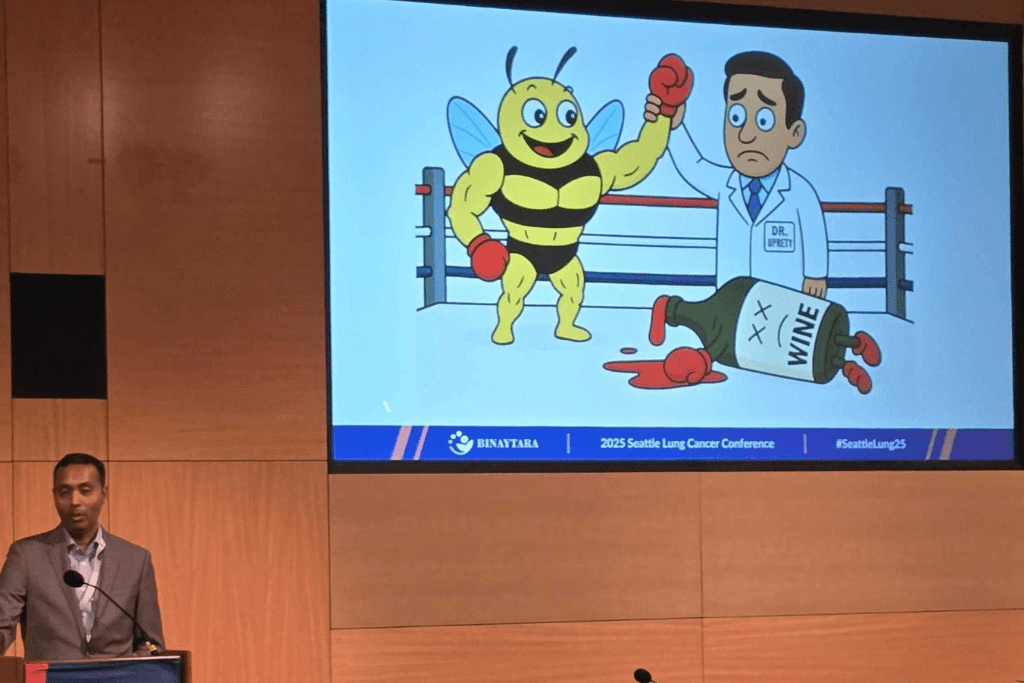
Dr. Ram Subramanian humorously declaring the win for ADCs.
In Session 2, the focus shifted toward diagnostic tests, immunotherapy, and technological approaches in lung cancer care. Chaired by Dr. Joseph Rosales, a hematologist-oncologist at Virginia Mason Franciscan Health, the session included debates on minimal residual disease (MRD) testing in lung cancer management, perioperative immunotherapy, and the use of proton versus photon therapy. Adding humor to the discussion, one speaker quipped that her country had won the World Cup, giving her argument a playful, off-topic twist. Another friendly jab occurred when a proponent of proton therapy teased the photon therapy supporter, noting he had trained at the New York Proton Center. Beyond the humor, each debate enlightened attendees on critical components of lung cancer care. From the use of ctDNA testing in routine practice to access barriers to proton therapy, the discussions left each participant with valuable insights to take back to their clinical practice.
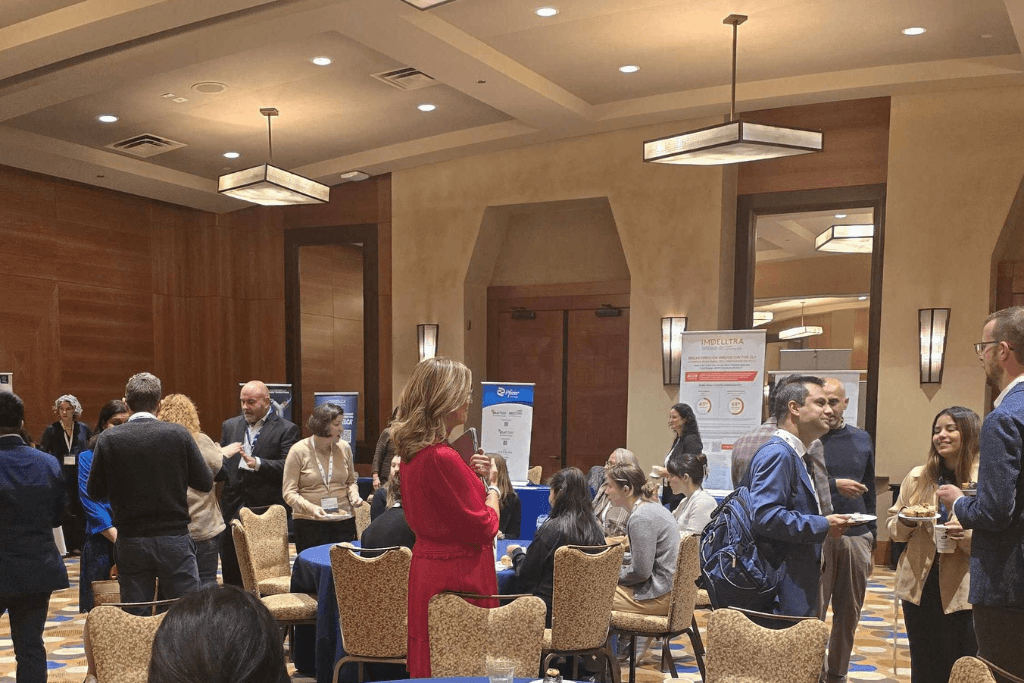
Attendees interacting with each other and with the exhibitors at the Lung Cancer Conference.
Keynote Lecture Showcases Surgical and Technological Progress
Dr. Eric Vallieres, Medical Director of the Division of Thoracic Surgery at Swedish Medical Center, delivered a reflective keynote lecture on his 40 years in thoracic oncology. He highlighted how advancements in surgical tools and techniques have drastically reduced patient morbidity and hospital stays over the decades. For example, he explained, “The improvement of surgical staplers enabled smaller incisions and less pain, shifting from large open surgeries to minimally invasive ones. Initial staplers were unreliable, especially on vessels, causing risky misfires in early cases.”
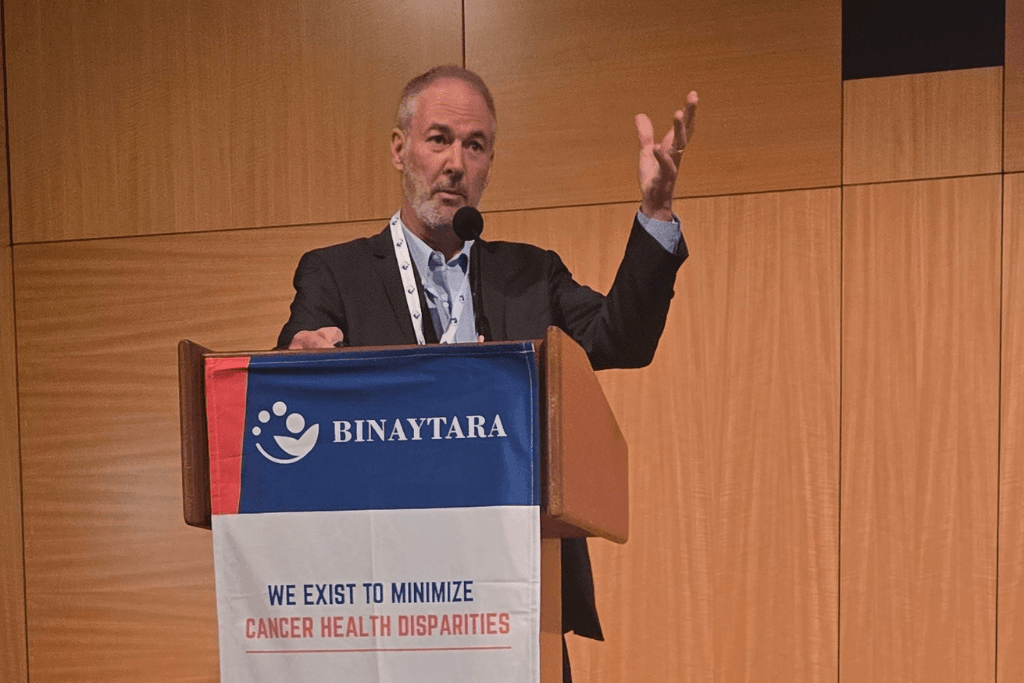
Dr. Eric Vallieres presenting the keynote lecture.
Dr. Vallieres also emphasized similar evolution in radiology and imaging, noting that advances have shifted decision-making from limited X-rays to advanced CT scans, improving surgical planning. He discussed pivotal clinical trials that shaped lung cancer treatment, citing several foundational studies such as the S9900 trial. He concluded the lecture by expressing appreciation for how far the field has come in lung cancer staging, multidisciplinary collaboration, precision medicine, and the value of mentorship in research.
Targeted Therapies Transforming Lung Cancer Outcomes
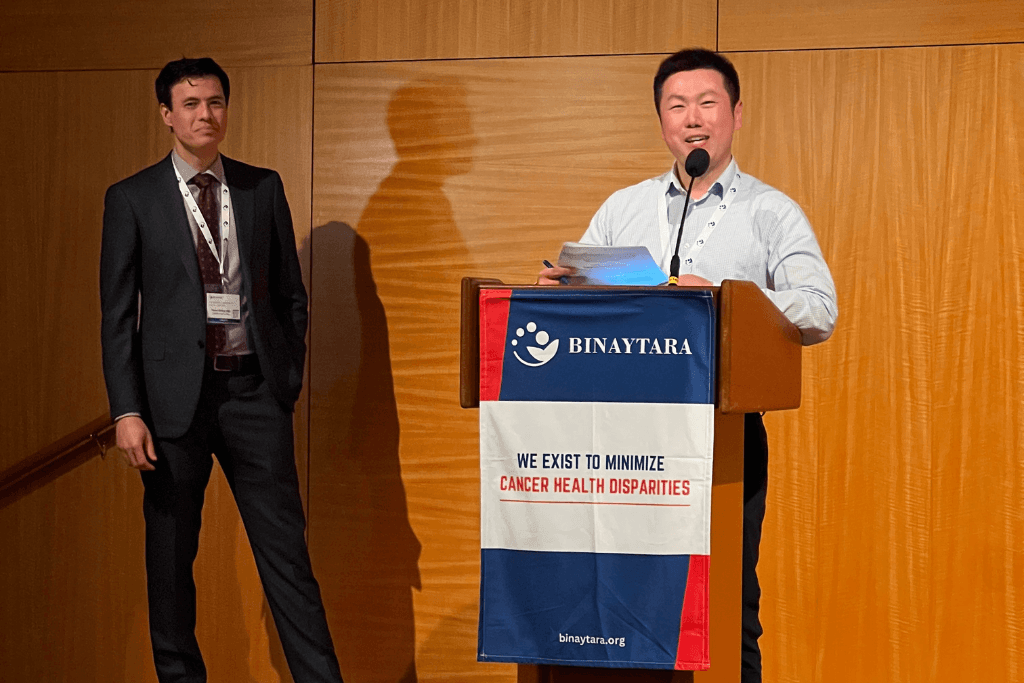
Conference co-chair Dr. Lei Deng (right) led discussions on targeted therapies driving advances in lung cancer treatment.
Session 4, led by conference co-chair Dr. Lei Deng, a medical oncologist at Fred Hutch and assistant professor in the Division of Hematology and Oncology at the University of Washington School of Medicine, focused on the growing role of targeted therapies in lung cancer. The session brought a flurry of scientific acronyms to life as leading thoracic oncologists discussed advances in EGFR, ALK, ROS1, HER2, MET, and KRAS. Each of these molecular targets, as the speakers demonstrated, continues to show promising efficacy in improving lung cancer outcomes. Presentations throughout the session highlighted what’s new and emerging in the field and underscored the need for continued research to further enhance patient outcomes.
Lung Cancer Challenges and Case Reviews in Thoracic Oncology
As a fitting close to the opening discussion on cancer disparities, the conference concluded with breakout sessions on real-world issues and challenges in thoracic oncology. Speakers from the Swedish Cancer Institute and Temple University Hospital explored barriers to language access, emphasizing how limited English proficiency and inefficient communication systems can hinder both lung cancer treatment and the overall patient experience. Angie Larsh, ARNP (Fred Hutch), also addressed the importance of integrating primary palliative care early in treatment, underscoring its value in improving outcomes, particularly for patients from minority communities.
Addressing Barriers and Promoting Health Equity in Lung Cancer Care
As attendees made their way out, passing the giant lung-shaped balloons in the lobby, the hall still buzzed with the spirited debates, witty exchanges, and thoughtful discussions on lung cancer care. Those moments lingered, imprinted in the minds of participants as they returned to their clinics and patients.
The Seattle Lung Cancer Conference was designed to bridge the gap between research and clinical practice. As one of the attendees, Dr. Christina Baik, captured its essence perfectly: “We are not here to present new data, but to deeply discuss the nuances and practical implications of existing research. By sharing different perspectives on published studies, we aim to make better, more informed decisions for our patients.”